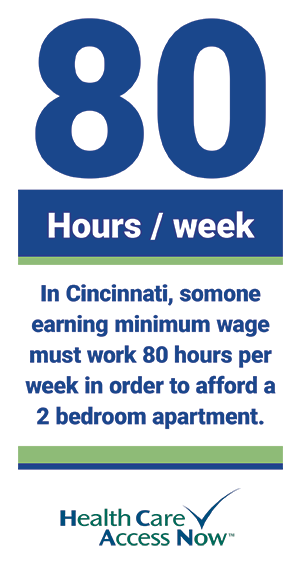Community Health Workers’ Housing Educations

Health Care Access Now (HCAN) trains and dispatches Community Health Workers (CHWs) to assist vulnerable people in the Cincinnati community so they can achieve good health outcomes. Using the Pathways Community HUB model (HUB), CHWs identify and help remove clients’ obstacles to a healthy life. CHWs provide Educations on each of these barriers.
One such common barrier is Housing. A lack of suitable housing can negatively influence health outcomes in a wide variety of ways. For example, living in an apartment that isn’t regularly maintained could mean exposure to mold, thus increasing the incidence of allergies and asthma for its inhabitants. Or stress about being able to pay rent out of proportion with income could lead to mental health issues and even chronic disease.

[The link between housing and mental health]
Housing Educations being developed
A team at HCAN is working to create consistent Educations for CHWs to provide to clients. Each team member—including Bettie Johnson, HUB Operations Coordinator, Denise Harris, Director, Care Coordination Services, and Giacoma Telich, CHW—has the goal of imparting information to clients that allows them to be more self-sufficient.
These Educations primarily have to do with eviction prevention and financial stability. To help keep clients from being evicted, CHWs provide them with information on housekeeping, not letting people who are not on the lease live in the home, drug dealing, and vandalism. The financial stability Education focuses on monthly budgeting.
Johnson says that HCAN is also developing a program that will result in participants receiving a certificate. “We’re connecting with different housing complex owners,” she says. The certificate would demonstrate to those landlords that the client “had educated [themselves] on things to do and not to do,” according to Telich, which tells the landlord, “Okay, this person is serious about getting this apartment and maintaining it.”
For the clients, this certificate provides a sense of accomplishment. “For a lot of people, this might be the only time they receive something like this,” Telich says, “so why not take the opportunity to help them be more [self-]sufficient and award them with this certificate? It says, ‘I’ve done the work.’”
[Rents keep climbing, affecting health negatively]
Crisis vs. behavioral change
CHWs immediately refer clients in crisis to the appropriate organizations so their situations can be rectified quickly. Those clients who are not in crisis go through the Educations where they learn various tactics for making their situations work better—both for themselves and for their landlords.
Johnson says that many clients “need help adjusting their thinking to recognize that they can only change their situation a little bit, or they’ll have to wait a while before their situation can be improved.” CHWs instruct clients on ways to “change their mindset on how to be a good tenant.”
Examples include “having a nest egg for small repairs so they aren’t constantly in need of help from the owner,” “letting the landlord know when you have another child,” or “reading the full terms of your lease.”
In some cases, Johnson says, clients experience a fear of failure. They get the opportunity to enter a new housing situation, but they worry that it will be a repeat of past bad situations. So they avoid moving in or behaving as a good tenant would, ruining the new situation for themselves.
Johnson hopes that these Housing Educations can have a positive effect on HCAN’s clients, allowing them to have more successful client/landlord relations and to find suitable housing situations.






